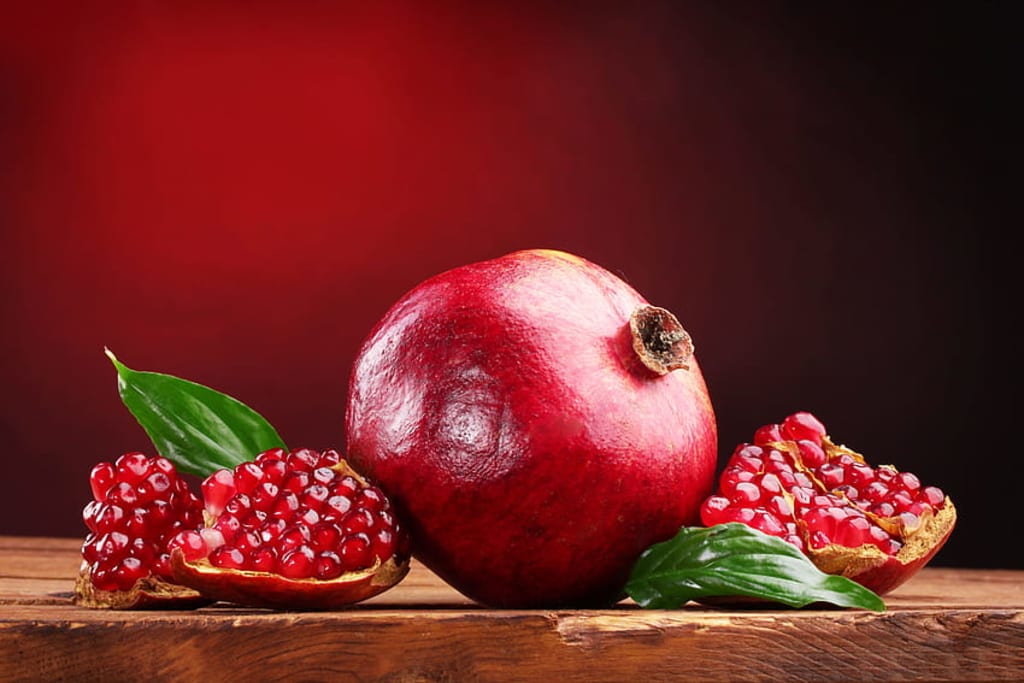This article examines the many nutritional and health benefits of pomegranates.
Pomegranate: 10 Health and Nutritional Benefits

Pomegranate: 10 Health and Nutritional Benefits
Pomegranates are low in calories and fat but high in fiber, vitamins, and minerals. Benefits include antioxidants, heart health, urinary health, exercise endurance, and more.
Pomegranates are round, red fruits. They feature a white inner flesh that’s densely packed with crunchy, juicy edible seeds called arils.
They may be best known for the vibrantly colored juice they’re often used in, but these unique fruits have a lot more to offer.
With the potential to support many aspects of health, from immunity to brain health, pomegranates are worth adding to your healthy eating routine.
This article examines the many nutritional and health benefits of pomegranates.
1. Packed with nutrients
The small pink seeds inside a pomegranate, called the arils, are the edible portion of the fruit. While they can be labor-intensive to remove from the fruit’s inner flesh, their nutritional profile and flavor are well worth the investment.
Overall, pomegranates are low in calories and fat but high in fiber, vitamins, and minerals. They also contain some protein.
Below is the nutrition for the arils in one average (282-gram) pomegranate fruit (1Trusted Source):
Calories: 234
Protein: 4.7 grams
Fat: 3.3 grams
Carbohydrates: 52 grams
Sugar: 38.6 grams
Fiber: 11.3 grams
Calcium: 28.2 mg, or 2% of the Daily Value (DV)
Iron: 0.85 mg, or 5% of the DV
Magnesium: 33.8 mg, or 8% of the DV
Phosphorus: 102 mg, or 8% of the DV
Potassium: 666 mg, or 13% of the DV
Vitamin C: 28.8 mg, or 32% of the DV
Folate (vitamin B9): 107 mcg, or 27% of the DV
Comparatively, a 1/2-cup (87-gram) serving of arils provides 72 calories, 16 grams of carbs, 3.5 grams of fiber, 1 gram of fat, and 1.5 grams of protein (1Trusted Source).
Keep in mind that the nutritional information for pomegranate and arils differs from that of pomegranate juice, which won’t provide much fiber or vitamin C. This applies to fruit in general — eating the whole form will provide more fiber (2Trusted Source).
Pomegranates in their whole fruit form are low in calories and fat and high in fiber, vitamins, and minerals. They even contain some protein. Enjoy the nutritional benefits of pomegranate by eating the seeds, or arils, inside.
2. Rich in antioxidants
Antioxidants are compounds that help protect the cells of your body from damage caused by free radicals. Free radicals are always present in your body, but having too many of them can be harmful and contribute to a number of chronic diseases (3Trusted Source).
Pomegranates are rich in antioxidants and polyphenolic compounds that offer protection from this damage. The main bioactive compounds with antioxidant activity that are found in pomegranates are called punicalagins, anthocyanins, and hydrolysable tannins (4Trusted Source, 5Trusted Source, 6Trusted Source).
Getting antioxidants from vegetables and fruits such as pomegranates is a great way to support overall health and help prevent disease (6Trusted Source).
Pomegranates are rich in an array of antioxidant compounds that help protect your cells from free radical damage.
3. May help keep inflammation at bay
Short-term inflammation is a normal bodily response to infection and injury. However, chronic inflammation can be a problem if left untreated — and it’s common today, particularly in Westernized cultures.
When inflammation isn’t addressed, it can contribute to many chronic conditions, including heart disease, type 2 diabetes, cancer, and Alzheimer’s disease. Eating pomegranates may help prevent the chronic inflammation associated with increased chronic disease risk (7Trusted Source).
This is largely attributed to compounds called punicalagins, which have been shown to have antioxidant and anti-inflammatory properties in test-tube and animal studies (8Trusted Source, 9Trusted Source, 10Trusted Source).
Some human studies have also found that consuming pomegranate juice can reduce markers of inflammation in the body (6Trusted Source, 11Trusted Source, 12Trusted Source).
Still, more research is needed regarding how eating fresh pomegranate seeds affects inflammation in humans.
Although more research is needed, pomegranates contain compounds that may help prevent chronic inflammation associated with increased chronic disease risk.
4. May have anticancer properties
Some test-tube studies have found that compounds in pomegranate fruit, juice, and oil can help kill cancer cells or slow their spread in the body (5Trusted Source, 13Trusted Source, 14Trusted Source).
Both test-tube and human studies indicate that pomegranate may help fight inflammation and slow cancer cell growth. In fact, the fruit has demonstrated anti-tumor effects in cancers of the lung, breast, prostate, skin, and colon (5Trusted Source).
Other animal research has found that pomegranate helps slow tumor growth in the early stages of liver cancer. It also helps suppress inflammatory responses and oxidative stress (15Trusted Source).
According to an older test-tube study, pomegranate extract may also be useful for slowing the growth, or even causing the death, of prostate cancer cells (16Trusted Source).
Prostate-specific antigen (PSA) is a marker of prostate cancer in the blood. If PSA levels double in a short amount of time, it indicates a significantly higher risk of death from prostate cancer.
Two older trials found that giving men pomegranate juice or extract extended the PSA doubling time period significantly, reducing the risk of death from prostate cancer (17Trusted Source, 18Trusted Source).
Pomegranate has been observed to have anticancer effects. It may slow tumor growth and spread and reduce inflammation, although more research is needed to learn more.
5. May offer heart health benefits
There is evidence that fruits rich in polyphenolic compounds, such as pomegranate, may benefit heart health (4Trusted Source, 6Trusted Source).
Test-tube studies have found that pomegranate extract may reduce oxidative stress and inflammation in the arteries, lower blood pressure, and help fight atherosclerosis — plaque buildup in the arteries that can lead to heart attacks and strokes (4Trusted Source).
In one human study, people with heart disease were given 1 cup (220 mL) of pomegranate juice daily for 5 days. The juice significantly reduced the frequency and severity of chest pain, as well as certain biomarkers in the blood that suggest a protective effect on heart health (19Trusted Source).
Still, high quality research on pomegranate and heart health in humans is lacking.
Compounds in pomegranate may reduce blood pressure and inflammation in the arteries, help fight plaque buildup that can lead to heart attacks and strokes, and reduce heart-related chest pain.
6. Support urinary health
Test-tube and human studies have found that pomegranate extract may help reduce the formation of kidney stones, a benefit that’s largely attributed to its antioxidant activity.
In one study, adults ages 18–70 experiencing recurrent kidney stones were given 1,000 mg of pomegranate extract for 90 days. This was found to help inhibit the mechanism by which stones are formed in the body (20Trusted Source).
Additionally, animal studies have found that pomegranate extract can help regulate the concentration of oxalates, calcium, and phosphates in the blood, which are common components of kidney stones (21Trusted Source).
Compounds in pomegranate may help reduce kidney stones, possibly as a result of their antioxidant properties.
7. May have antimicrobial properties
Pomegranate compounds may help fight harmful microorganisms such as certain types of bacteria, fungi, and yeast (12Trusted Source, 22Trusted Source, 23Trusted Source).
For instance, both older and newer studies suggest that they may protect the health of your mouth by targeting unwanted oral germs that can become problematic when overgrown — such as ones that cause bad breath and promote tooth decay (24Trusted Source, 25Trusted Source, 26Trusted Source).
A test-tube study found that compounds from pomegranate also had antibacterial effects against Listeria monocytogenes, a bacteria found in moist environments that can cause severe illness if ingested (27Trusted Source).
Pomegranates contain compounds that help fight off potentially harmful bacteria, fungi, and yeasts — particularly germs in the mouth that can cause bad breath and tooth decay.
8. May improve exercise endurance
The polyphenols in pomegranates may increase exercise endurance, the length of time you’re able to partake in a physical activity before getting tired.
One human study found that taking just 1 gram of pomegranate extract 30 minutes before running increased the time to exhaustion by 12% (28Trusted Source).
Other human research has found that pomegranate supplements have the potential to improve both exercise endurance and muscle recovery (29Trusted Source).
However, research using pomegranate juice has found no benefit for muscle recovery after exercise that targeted elbow flexors, indicating that more studies are needed on the topic of pomegranates and exercise performance and recovery (30Trusted Source).
Pomegranates contain compounds that may improve exercise endurance and recovery.
9. Good for your brain
Pomegranates contain compounds called ellagitannins, which act as antioxidants and reduce inflammation in the body.
As such, they also offer protective benefits for your brain against conditions that are influenced by inflammation and oxidative stress.
Some studies have found that ellagitannins may help protect the brain from developing Alzheimer’s disease and Parkinson’s disease by reducing oxidative damage and increasing the survival of brain cells (31Trusted Source, 32Trusted Source).
They may also support recovery from hypoxic-ischemic brain injury (31Trusted Source, 32Trusted Source).
The ellagitannins in pomegranate are believed to help produce a compound in the gut called urolithin A, which has been studied for its ability to reduce inflammation in the brain and delay the onset of cognitive diseases (31Trusted Source, 32Trusted Source, 33Trusted Source).
Nonetheless, more studies are needed to better understand the potential connection between pomegranate and brain health.
Compounds in pomegranate may help protect brain health, especially when it comes to Alzheimer’s disease, Parkinson’s disease, and recovery from brain injury.
10. Supports digestive health
Older and newer research suggests that digestive health, determined largely by your gut bacteria, is strongly linked to overall health. As such, it’s important to support your digestive health, and pomegranate can be a part of that effort (34Trusted Source, 35Trusted Source, 36).
Some older and newer animal studies have found that pomegranate has anti-inflammatory and anticancer effects that require activity in the gut and largely involve its ellagic acid content (37Trusted Source, 38Trusted Source, 39Trusted Source, 40Trusted Source).
Test-tube studies have also found that pomegranate can increase levels of beneficial gut bacteria, including Bifidobacterium and Lactobacillus, suggesting that it may have prebiotic effects (41Trusted Source).
Prebiotics are compounds, generally fibers, that serve as fuel for the good bacteria, or probiotics, in your digestive tract. Prebiotics allow these bacteria to thrive and support a healthier gut microbiome (42Trusted Source).
Additionally, pomegranate arils are rich in fiber, offering around 3.5 grams per 1/2-cup (87-gram) serving (1Trusted Source).
Fiber is essential for digestive health and may protect against some digestive conditions, such as constipation, hemorrhoids, colon cancer, gastroesophageal reflux disease, and diverticulitis (43Trusted Source).
Pomegranate compounds may promote healthy gut bacteria and reduce inflammation in the digestive tract. The arils are also rich in fiber, which serves as fuel for probiotics and helps prevent certain digestive health conditions.
The bottom line
Pomegranates are juicy, sweet fruits with edible seeds called arils packed tightly inside. They’re rich in fiber, vitamins, and minerals and even contain some protein.
They’re also full of antioxidants and anti-inflammatory compounds such as punicalagins. These have been studied for their protective benefits for heart, urinary, brain, digestive, and prostate health.
Pomegranate may also have anticancer benefits, support exercise endurance and muscle recovery, and fight off harmful germs.
Although human research on some of these potential benefits is lacking, it’s safe to say that pomegranate is a tasty, nutritious addition to your diet.
Just one thing
Try this today: Next time you go to the store, grab a pomegranate! To easily remove the arils, cut the fruit in half, submerge it in water, and peel out the arils using your fingers.
I like eating them on their own as a snack, sprinkling a few on top of avocado toast, mixing them into leafy green salads, stirring them through Greek yogurt, and even adding them to smoothies.
Shere
About the Creator
Enjoyed the story? Support the Creator.
Subscribe for free to receive all their stories in your feed. You could also pledge your support or give them a one-off tip, letting them know you appreciate their work.






Comments
There are no comments for this story
Be the first to respond and start the conversation.